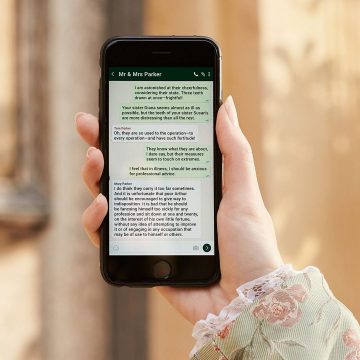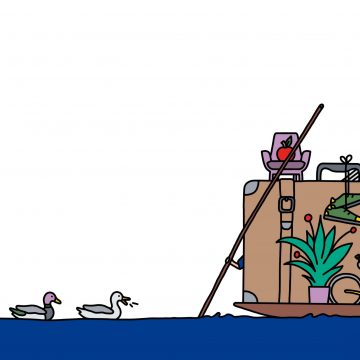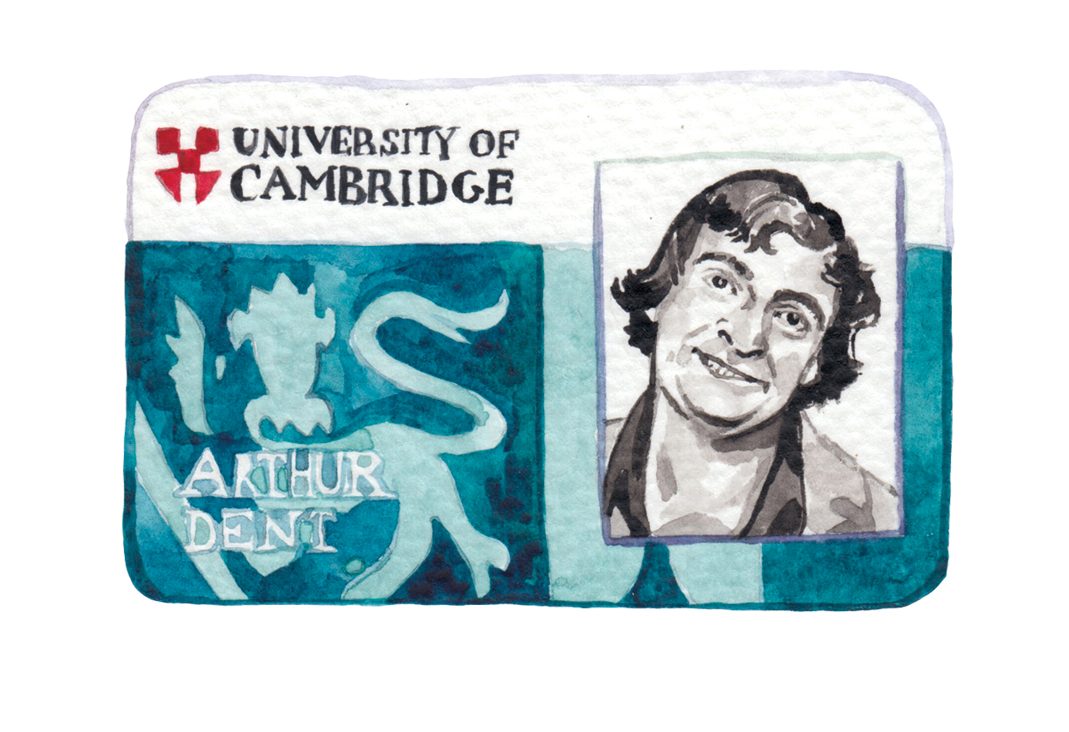
A Hitchhiker’s Guide to Douglas Adams at Cambridge
Douglas Adams came up to St John’s in 1971. Seven years later, the first episode of The Hitchhiker’s Guide to the Galaxy aired. As his archive goes on display at St John’s, CAM asks Adams’s Cambridge friends and collaborators about his comic genius.
On 24 March 2018, at a university college in a former marsh on an insignificant blue-green planet in the unfashionable end of the western spiral arm of the Galaxy, an extraordinary event took place. An array of carbon-based life forms converged on the Old Library at St John’s to stare at artefacts including unpublished book drafts, flyers for student revues, letters to members of Monty Python and even a copy of the International Youth Hostel Handbook from the mid-70s.
The items were drawn from the archive of the late Douglas Adams (St John’s 1971), creator of The Hitchhiker’s Guide to the Galaxy universe, the Dirk Gently novels and a wealth of other writings. “When the Adams estate sent us the material, there were dozens of boxes from various locations and it took a while to get them into a consultable state,” says Dr Adam Crothers (Girton 2002), special collections assistant at St John’s. “These were the possessions of someone not famously organised, and who had no reason to believe he needed to get his affairs in order.”
Highlights of the archive include early drafts for Hitchhiker, a letter from screenwriter Andrew Marshall – an inspiration for the character of Marvin the Paranoid Android – and copies of fanzines devoted to Adams’s work. But for Crothers and many of Adams’s dedicated fans, the relics of his earlier life were most compelling. “We have copies of the Eagle and Boys’ World comics that carried his first published writing, from when he was 12,” says Crothers, “and even one of his Cambridge entrance exam papers, with his annotations.”

The archives cast light on some of the mythology that has sprung up around Adams. His legendary writer’s block, fear of deadlines and lapses into self-doubt and despair are borne out in the many notes he scribbled to himself (including one exasperated lament that “Hitchhiker’s Guide to the Galaxy is a berk – it does not interest me”).
Other myths prove less robust, such as the notion that he only wrote three essays in his whole three years of reading English at Cambridge. “He may have talked down the academic aspect but he took his studies seriously,” says Crothers. “This is someone who cared about thinking and wanted to figure out how things worked. Before he was doing it with science fiction, he was doing it with literary analysis. This glimpse of Adams the academic is one of my favourite parts of the archive.”
Another perspective on Douglas Adams and his archive is supplied by the recollections of those who knew him at Cambridge and beyond. Now all – and more – can be revealed…
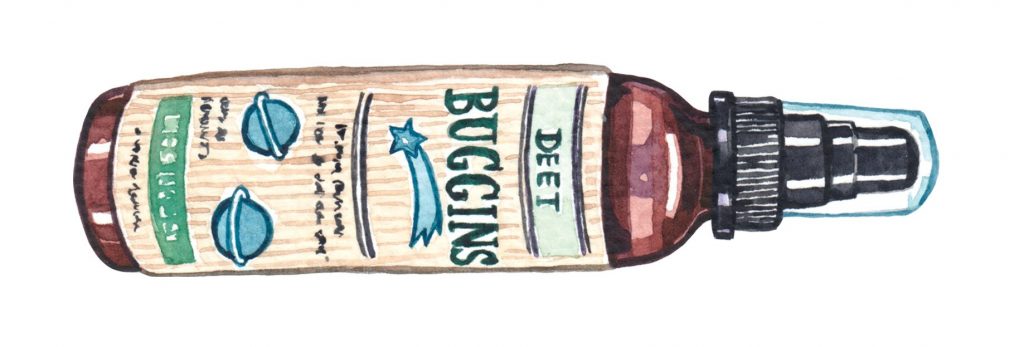
Martin Smith
As part of the comedy team Adams Smith Adams, Martin Smith (Fitzwilliam 1971) wrote and performed with Adams during and after their time at Cambridge.
“Douglas and I got into Footlights at the same time, in the spring of 1972. I started writing with Will Adams, and then introduced the two Adamses to each other, and we wrote around 50 to 70 sketches a year as Adams Smith Adams. Usually, Douglas would come bounding up to Fitzwilliam with a paragraph that was immensely funny and that he was very proud of. He’d hand it over and we’d work it into a sketch of two or three minutes. Douglas would chop it back down to 30 seconds, and the process would start over again. It was like a frustrating game of consequences, but it was a constructive way of working.
The thing we were most proud of was a sketch that centred on the Crawley and District Paranoid Society. In the pub after a revue, I recall Monty Python’s Graham Chapman (Emmanuel 1959) shouting: ‘You bastards! I wish I’d written that.’ It was the high point of our co-operative efforts.”
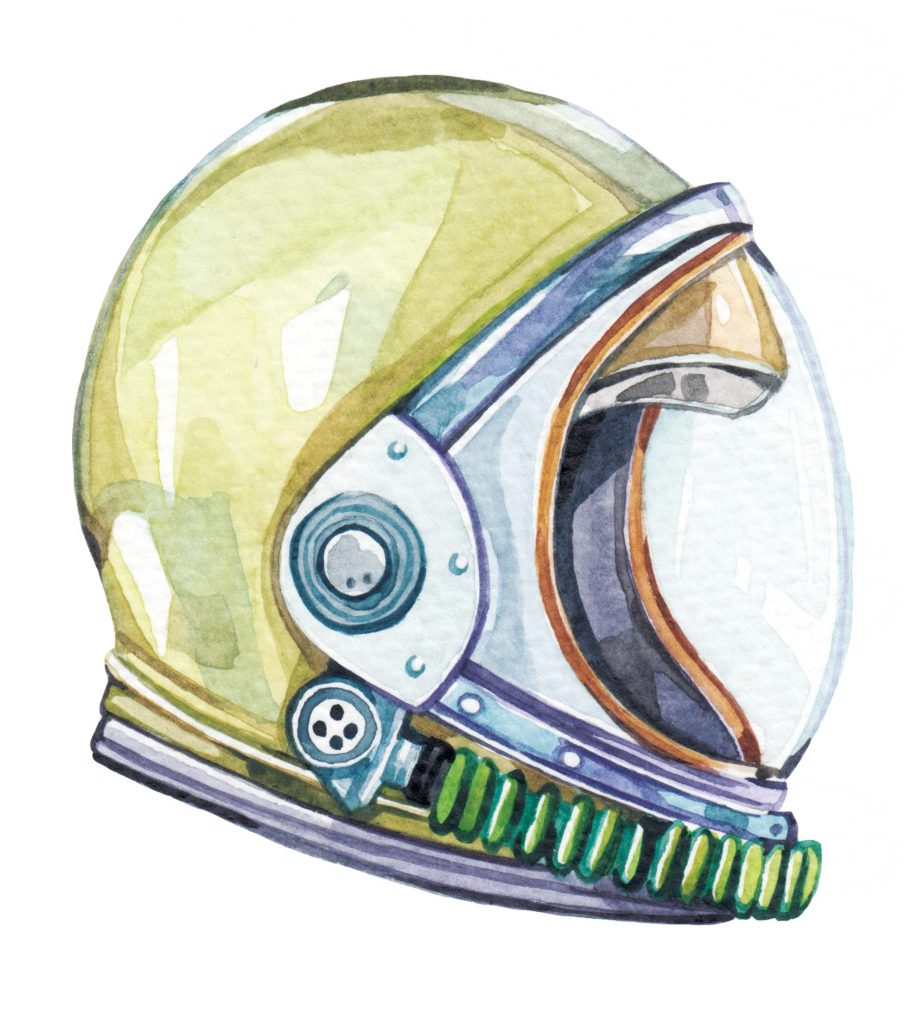
Will Adams
Will Adams (Fitzwilliam 1971) was the final third of the Adams Smith Adams ensemble – and, like the other Adams, juggled his comedy commitments with reading English.
“What I remember best about working with Douglas was the sheer pleasure of delivering funny material on stage. When we put on a revue, we’d go on late at night in front of a packed house of students who were disposed to enjoy themselves.
“Douglas had a far more surreal mind than Martin and I did. He needed journeyman scriptwriters like us to turn his funny lines into something with a beginning, middle and punchline that we could put on stage. He was the ideas man and we did the banging into shape.
“He was very forward in contacting useful people. Famously, he saw John Cleese (Downing 1960) at an underground station and introduced himself. We ended up being invited to Cleese’s flat to go through our material – it was like a College supervision. That was down to Douglas’s self-confidence.”
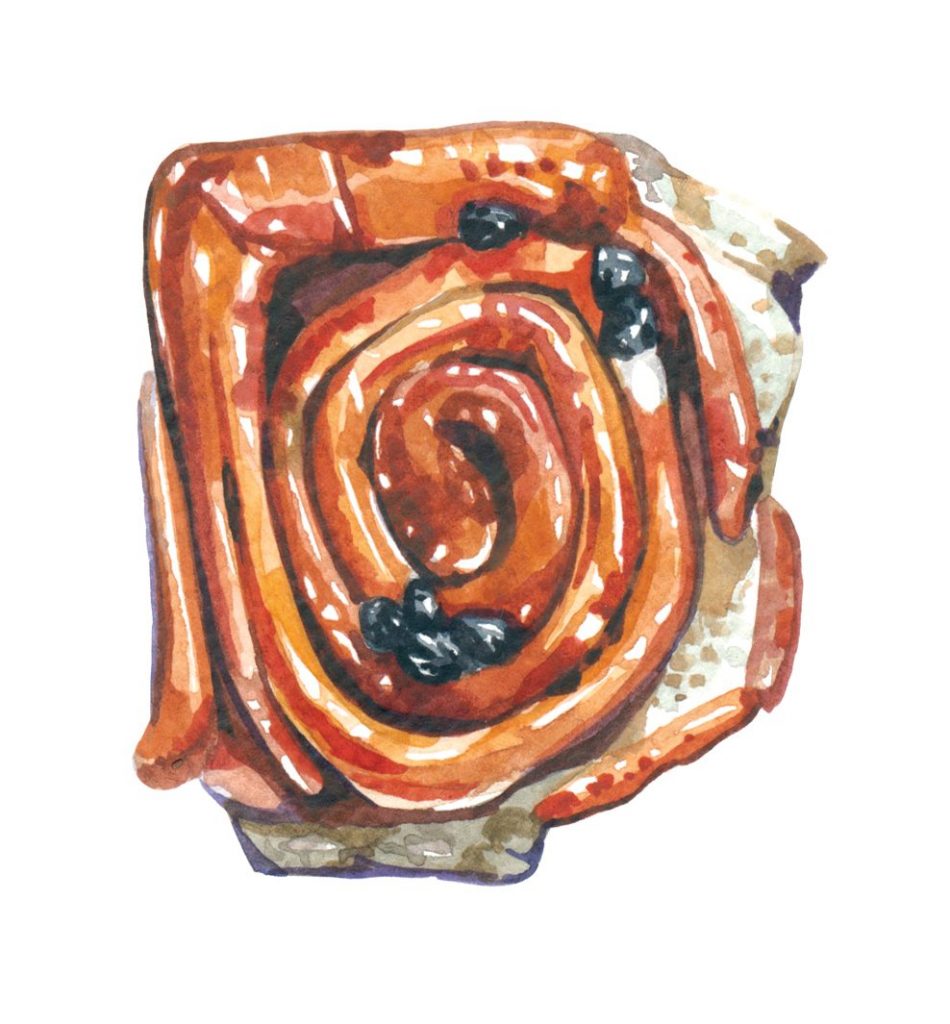
Mary Allen
For a 1974 revue, Mary Allen (New Hall 1970) was recruited to an expanded ensemble, Adams Smith Adams Smith Adams. She would become Adams’s housemate and a lifelong friend.
“I joined the group as Mary Adams because I’d joined Equity and there was already a Mary Allen in the union. I remember Douglas in the revues we did as being very physically conspicuous. He always looked as though he was about to share the joke with the audience, and he found it very difficult to perform without starting to laugh himself.
“I don’t think his writing style altered that much for Hitchhiker – he was just applying his talent to a longer narrative, and I think that suited his style much better. He always found it difficult to produce material he was satisfied with. They say that you shouldn’t let the best become the enemy of the good, but Douglas had terrible writer’s block. It was that degree of perfectionism.”
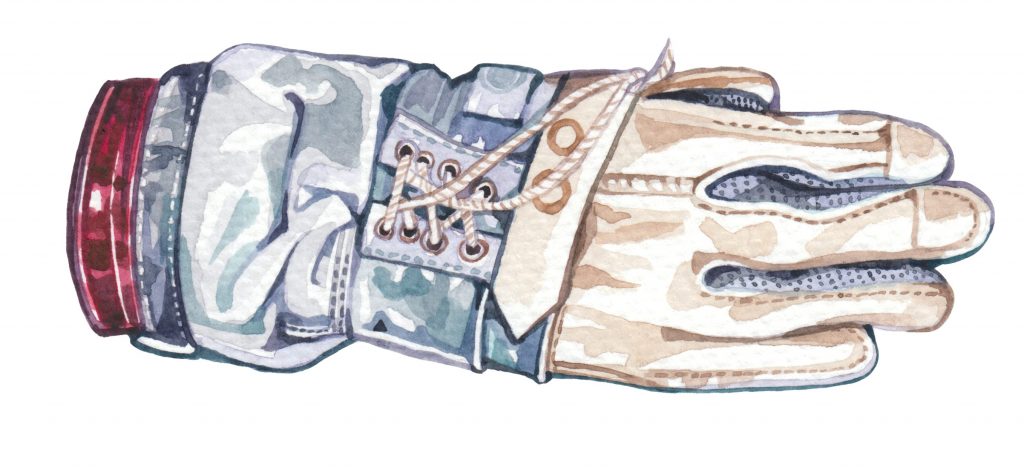
John Lloyd
John Lloyd (Trinity 1970) became the fifth member of the increasingly inaccurately named trio. He was an important collaborator with Adams, co-writing two episodes of the original Hitchhiker radio series.
“Douglas was improbably successful at a very young age. He used to say that he’d be a millionaire by the time he was 33 1/3 – after the old LP record speed – and, of course, everyone laughed. But he was the first of our contemporaries to become seriously wealthy.
“Both at Cambridge and later, he did find writing very difficult. People used to ask him, ‘Where do you get your ideas from?’, and he’d say, ‘I sit here and stare at a piece of paper until my head bleeds.’ He’d spend nine months writing the first page of a book and then realise the deadline was roaring at him.
“The notes in the archive that Douglas wrote to himself are heartrending, really, because he used to get so low. He’d be high as a kite when a book came out and would become this convivial, party-giving guy for a while, but then it would dawn on him that he had to write another one.”
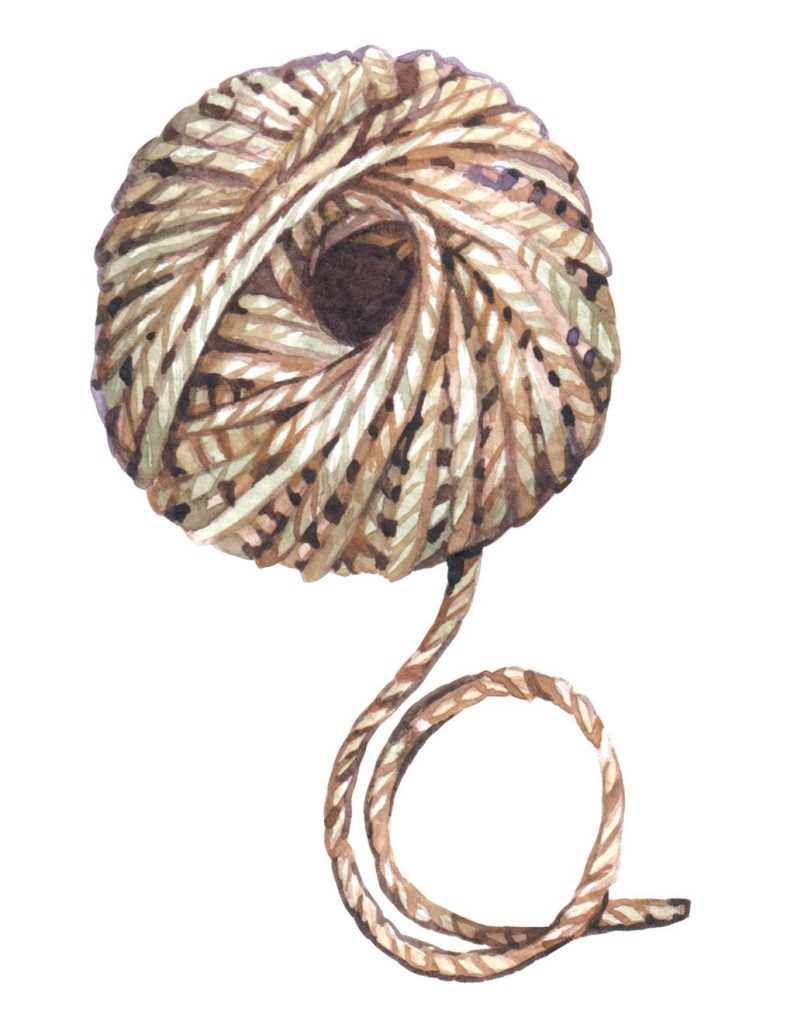
Geoffrey Mcgivern
Geoffrey McGivern (Christ’s 1972) has played Ford Prefect in all the BBC Radio productions of Hitchhiker.
“The first time I saw Douglas was in my first weeks at Cambridge, on a tour of the Union. We were shown the debating chamber, where the president was announcing the next speaker. Everyone was in black tie, but in walked an incredibly tall man in pyjamas, eating a bowl of cereal, who proceeded to be absolutely hilarious. I met him soon after at a Footlights Smoker.
“Later, I was sent the script for the Hitchhiker pilot out of the blue in 1978. I think there was something of me in Douglas’s characterisation of Ford Prefect. He once told his sister that this was the case – and that, like Ford, I was someone who could talk for half an hour about a new pair of shoes. But Arthur Dent was definitely based on Simon Jones.”
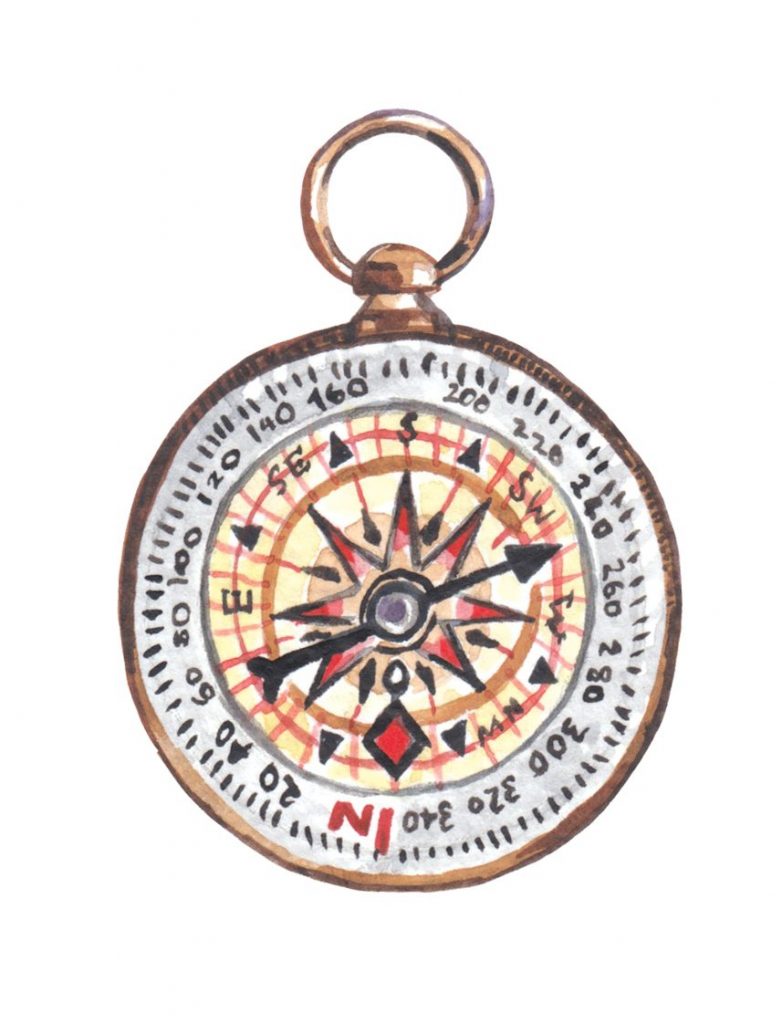
Simon Jones
Adams was admitted to Footlights by Simon Jones (Trinity Hall 1969), who went on to play Arthur Dent in all the radio and television incarnations of Hitchhiker.
“Douglas’s audition was memorable. He came on and pretended to be a human water pump, which stood out among all these undergraduates making intellectual jokes about Dante or Kant. We thought, well, if he’s prepared to make a fool of himself on stage, that’s very helpful.
“I think, though, that he was a serious person at Cambridge. You had to make some sort of effort and showing on your degree, otherwise you’d be sent down. If you read English, as Douglas and I did, it was a little easier; but you still had to hit your deadlines.
“Often, the people setting and reading your essays had written books on the subject, so it was a useful thing to flatter them by coming up with their own opinions. I think Douglas knew how to play the system very well, and at the same time have a good time.”
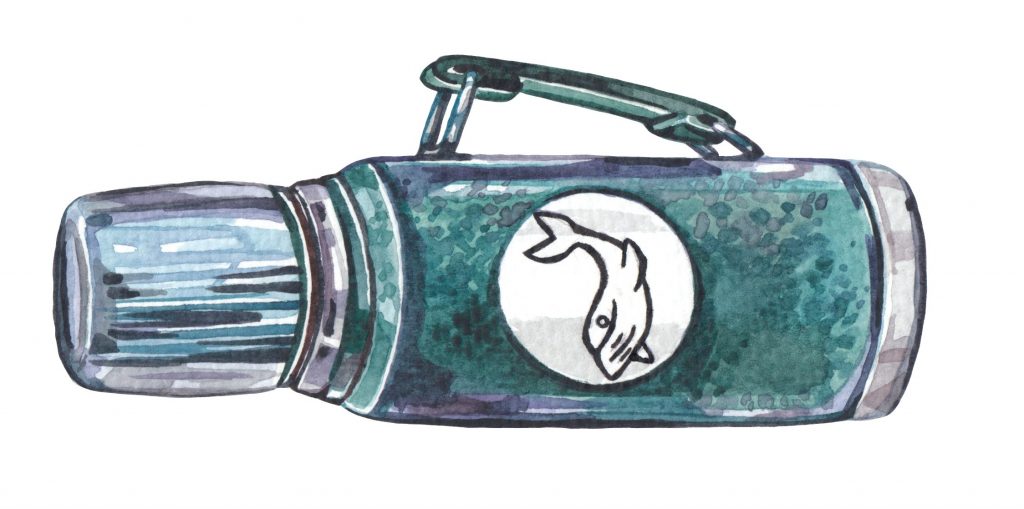
Mark Wing-Davey
Mark Wing-Davey (Caius 1967) played Galactic president Zaphod Beeblebrox in all the radio and television versions of The Hitchhiker’s Guide to the Galaxy.
“I left Caius in 1970, so I predated Douglas at Cambridge. When I was cast in Hitchhiker, I thought maybe it was something to do with the Footlights connection, but it wasn’t. I’d been in a TV show called The Glittering Prizes – all about Cambridge, ironically – and that was the genesis of my casting.
“I think Douglas did have something that was characteristically Cambridge – or rather, Footlights – in his humour. There was a tradition of that kind of linguistic eccentricity and willingness to play with structure; it was encouraged and appreciated by the Footlights. But he very much had his own style. [BBC producer] Geoffrey Perkins once said of a script that imitated Hitchhiker that it had a fabulous look but a tin ear. As a performer, you learn to value Douglas’s words.”
Michael Bywater
Michael Bywater (Corpus 1972) came to know Adams well in the 1980s. Their collaborations included the interactive fiction games, Bureaucracy and Starship Titanic.
“Even at Cambridge, Douglas wasn’t a slapstick character. There was a slight unease about him, which was surprising in someone so talented. I think it was partly because he was so big.
“He couldn’t talk without gesticulating. You’d often get his left arm whirling in enthusiasm and the finger of his right hand wagging in disapproval at the same time. I got to know their radius of operation so I could keep out of the way. He always had this boundless enthusiasm for the natural world, and never lost his sense of wonder. Though he was a great populariser of science, he never saw things through a scientist’s eyes. Douglas was a humanities man who understood there was another way of seeing the world.
“He summed up our present political situation with his gag about Deep Thought [the computer built to find the answer to Life, the Universe and Everything – which turns out to be “42”]. People spend a huge amount of time finding ridiculously expensive answers when they haven’t bothered to formulate the question properly. Forty-two: that’s where we are now, isn’t it?”
The Hitchhiker’s Guide to the Galaxy is published by Penguin Random House
What should a hitchhiker carry at all times? A towel. This, the Guide argues, is because anyone meeting a hitchhiker in possession of a towel will naturally assume he also has a toothbrush, face flannel, soap, tin of biscuits, flask, compass, map, ball of string, gnat spray, wet weather gear and space suit. Or, as Adams put it: “Any man who can hitch the length and breadth of the galaxy, rough it, slum it, struggle against terrible odds, win through, and still know where his towel is, is clearly a man to be reckoned with”.

